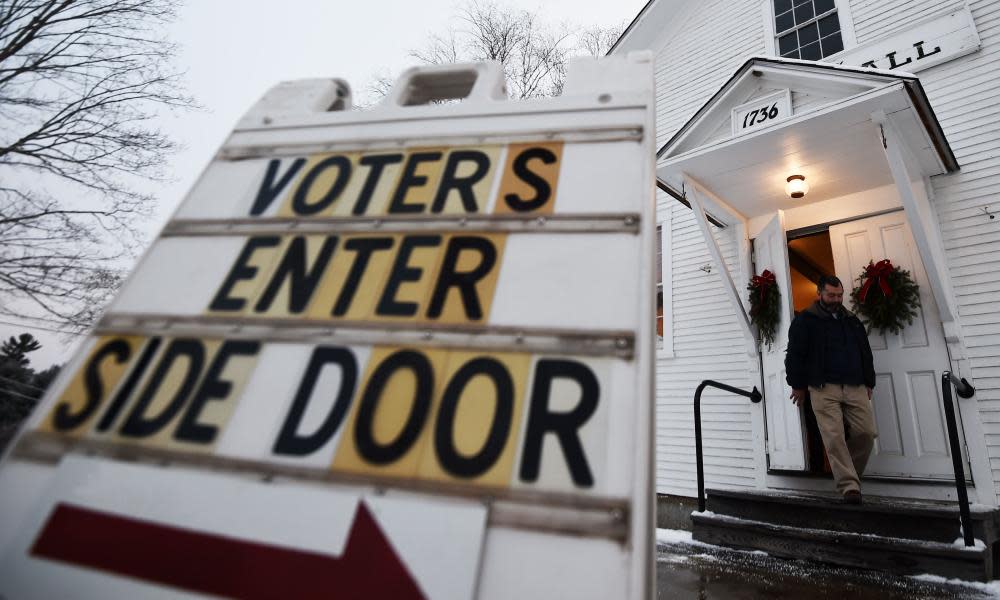Republicans win in effort to limit student vote ahead of key 2020 races

Maggie Flaherty grew up in a small town in California, but after she moved to New Hampshire to attend Dartmouth College, she registered to vote in the state where she would be spending at least four years.
Now she is embroiled in a fight against Republicans in the state that is being watched across the country.
Flaherty and a fellow student are challenging a Republican-backed law that is making it harder for many out-of-state students and other temporary residents to cast a ballot in a state with outsized national influence.
The lawsuit has been endorsed by the Massachusetts senator Elizabeth Warren and other Democratic presidential hopefuls. But last week, Flaherty and her colleague Caroline Casey hit another obstacle when the US district judge Joseph LaPlante denied a request to block the law just months before the primary elections.
New Hampshire is a small swing state where both local and state-wide races can be decided by razor-thin margins. Donald Trump lost the state to Hillary Clinton by just 2,736 votes in 2016. The same year, Maggie Hassan, also a Democrat, defeated Kelly Ayotte for a Senate seat by just 1,017 votes. The Democratic primary in February and general election in November are expected to be closely fought.
Republicans in the state have complained about college students voting before. “They are kids voting liberal, voting their feelings, with no life experience,” William O’Brien, a Republican and then the New Hampshire house speaker, said in 2011. There are nationwide efforts to restrict the surging student vote, but the party says the new law is merely intended to bring New Hampshire in line with other states.
The law, which went into effect on 1 July, mandates that anyone who has registered to vote and intends to drive while living in the state must obtain a New Hampshire driver’s license and register their vehicle within 60 days of signing up.
The ACLU of New Hampshire, which is bringing the suit, contends that in fact many states allow out-of-state students and other transient people, such as military personnel, to vote and exempts them from the requirement to get an in-state license, said the ACLU lawyer Gilles Bissonnette.
It may seem like a benign change, but critics of the law say it has created mass confusion and imposes an unfair burden on college students, and amounts to a “poll tax” on voting because of the costs involved in getting a license. “There’s nothing that’s really gained by this, there’s no way to really enforce it, so what’s the point of it?” said Kate Corriveau, the New Hampshire director of America Votes, an advocacy group. “The point of it, as we’ve kind of seen, is that it’s confusing. And it’s a little bit intimidating.”
It is also not clear how New Hampshire officials will check and enforce whether new voters with out-of-state documents get an in-state license. That uncertainty could deter students from signing up to get on the voter rolls, said Joseph Ramirez, a senior at the University of New Hampshire who has worked to educate people about the new law. “It’s almost like a scare tactic,” he said. “I’ve heard things like if you’re going to get pulled over, then they might fine you” if you have an out-of-state license, he said.
Warren’s campaign said in a court filing that the law was so confusing that her campaign could not advise college students on what they should do if they have an out-of-state license and want to vote in New Hampshire.
“We’re here to say two things: principle, everybody ought to be able to vote, but the second part is to say we have evidence that it’s causing a great deal of confusion,” Warren told New Hampshire Public Radio in November. “And when you’ve got confusion, you suppress voting.”
Michael Herron, a Dartmouth professor retained as an expert by the ACLU in the court case, found that the law would impact the young and transient population the most. While 1% of the total number people who cast a ballot in New Hampshire in the 2016 general election used an out-of-state ID, at least 36% of the college students who voted used one.
In his Wednesday ruling, LaPlante denied that the law was confusing and pointed to a November memo from New Hampshire officials outlining how it would work. Still, LaPlante asked the New Hampshire supreme court to clarify several aspects of the law, only adding to the uncertainty. The court could interpret the law in a way that is less restrictive to the students.
Flaherty, who is hoping to help students register to vote regardless of the decision, said students shouldn’t be penalized for wanting to vote.
“We fall into this unique category of wanting to be engaged, being informed people that are getting a higher education, but also we don’t know where we’re going to be,” she said. “We’re in kind of a limbo.”

 Yahoo News
Yahoo News 
